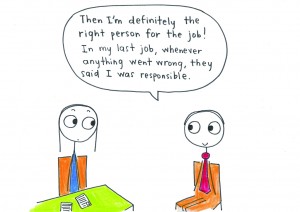A typical job interview has widened its horizons – it now allows applicants to ask their interviewer questions. Nirva Vira proposes questions that will make the right impression
old feet before a job interview is second nature; after all, you are expected to emerge victorious amongst students with CVs that might be as convincing as your own. But in spite of the competition, it is important to leave an impression in the mind of your future employer. Leave anxiety behind, calm your nerves and convince him that you are the right fit for the job. How do you do that and how do you get the interviewer to choose you over the rest? It’s simple – you question your interviewer.
“How would you describe the company’s culture and leadership philosophy?”
An important question, it displays an interest in the job and that time and trouble has been put into your research. A company’s working style and their culture reflect aspects that otherwise aren’t that easy to spot. For example, a company could be hierarchical – employees may be given an opportunity to ideate in order of their rank. It could also be flexible and allow all employees to brainstorm together regardless of their rank. Knowing the company culture will give you an insight into what could be your future.
“Is there anything missing in my CV?”
A CV is the most important, and often, the only way to showcase your capabilities to an interviewer. But there might be details it is missing. Through this question you allow yourself a chance to defend yourself before the interviewer makes a decision. Also, the interviewer would get a chance to weigh all your pros and cons and judge you more clearly.
“How do you see this position as contributing to the success of the organisation?”
It is a modest way of saying you want to make it big in the company. It shows that you hold the company’s progress and success before your own. Also, that you are ambitious and yet unselfish. And of course it gives a faint idea of the importance of your position in the organisation.
“What improvements do you hope I will bring to this?”
If this job isn’t a new opening, then obviously someone held it before. Although asking why the person who held it quit might pass you off as inquisitive, the interviewer might give you an answer. And vague though it might be, it will give you a hint of what the reason was. It will provide you direction if you are selected and will also show the interviewer that you are eager to be selected and keen to do the job sincerely and successfully.
“In what way is performance measured and reviewed?”
This question will put forth your hunger for appreciation and ambition, thus inferring an eagerness to do well in the company. The added bonus is that you too will discover what it takes to emerge victorious.
“Why do you see me as a probable candidate?”
It is your chance to get the interviewer to summarise your credibility and picture you as being the candidate to be chosen. He will also be forced to rethink what is needed in an ideal candidate and try and fit you into that mould.
“What personality traits would one require to excel at this job?”
This question will help understand the requirements of the job and the expectations of the interviewer. It will compel the interviewer to look at you as a person, beyond a piece of paper – your CV – and to see whether you possess the qualities required for the job.
“What comes next?”
Whether you intend to be in a company for a long or a short while, knowing your future is important. When talking about the future, do not pay attention only to the remuneration, but also to the changes in designation as you move up the ladder. Knowing that you have something to work toward is good motivation.
“What is the top priority of a person in this position?”
This question will help you understand the priorities that come with the job and what you will be expected to do if you are hired. Without knowing what is expected of you, it will be hard to meet goals and make an impression. The question will make clear your job, position, role and your tasks.
“Are my qualifications sufficient for this position?”
Every job today requires a certain amount of professional qualifications. That doesn’t mean that those who do not have them cannot be hired. Putting out questions about your education and qualifications implies that you have no qualms about discussing your probable professional weaknesses. If you do receive feedback, using it constructively will greatly help you in the long run.
Questions put to your interviewer can either break or make your interview. Here are some questions to steer clear of.
Does the company do background checks?
Why, do you have something to hide?
Does the job come with any benefits?
Show us how we will benefit from you first.
So what does your company do?
Seriously, have you done no research?
How quickly can I be promoted?
Slow down, mister.
Does the company monitor computer and internet usage?
Maybe we’ll monitor yours.
Did I get the job?
Patience sweetie; don’t tempt me to say no.
What happened to the last person who had this job?
It’s none of your business.
Volume 3 Issue 11
































